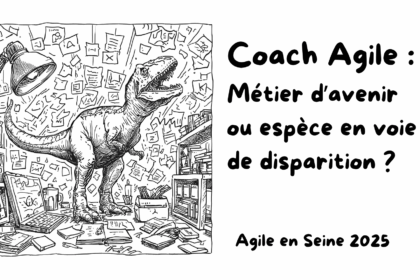After my talk at ProductWorld2023 I received a lot of questions, amongst which this one from Abdelillah HASSAM !
“ Might be a wrong question but that’s why I wanted to ask it to you Rachel Dubois. I notice that your are an agile coach for R&D teams.. Do we coach R&D teams the same way that we coach other product teams? How do you navigate through uncertainty that comes with it (I guess) with no factual roadmap ? Thanks for your feedback’
I really enjoyed thinking on how to answer properly, as it is quite tricky! One’s approach to coaching R&D teams would be highly influenced by its industrial background, by the cultural markers of the company, by leadership style … and also coach background (Product, Craft/ Tech, leadership etc … ) This answer is thus 100% subjective and not a statement not “the answer’ in any way 😉
First I wanted to address the roadmapping aspect, and the potential underlying assumptions that R&D organizations/teams don’t use roadmaps to guide and orient their work.
It is my belief that a roadmap can be an effective tool also for R&D teams to help them align, plan and prioritize their work. But it requires a slightly different approach than traditional product roadmapping, and of course it should not be a “over engineering detailed plans of committed deliverables” 😉
Here are a few tips for roadmapping with R&D teams:
- Focus on problems and opportunities => In R&D, the focus is on solving complex open-ended problems, so use those as the basis for the roadmap.
- Build in flexibility: R&D work is quite unpredictable, so remember that roadmaps are only forecasts, aka bets one makes based on today’s knowledge. Thus focus on short-term roadmaps that allows for experimentation and flexibility, and regularly re-evaluate and adjust as new information becomes available.
- Be inclusive and involve teams: R&D work is often highly specialized, and the best ideas for solving problems come from teams . So be super inclusive, encourage folks to share their ideas and insights, foster experimentation, and allow free communication with healthy friction around projects.
- Prioritize based on impact: R&D work involves a lot of experimentation and exploration, and lot of hypotheses might take you to dead ends or might burn more resources (time, $, energy…) ; prioritize projects based on their potential to solve the key problems identified , use rationals and data, and provided guardrails (leading and lagging indicators, constrains, etc) At Spotify we use the DIBB framework to structure that in lightweight way and connect our ambitions to our north star goals and mission.
- Communicate, communicate, communicate (ad libitum): create traction based on transparency, this will nurture alignment, while team autonomy will enable speed.
From the coaching point of view, I find that coaching R&D teams is similar in many ways to coaching any other product teams, especially when R&D is the Product. I also acknowledge some unique challenges and needs that come with working in R&D, and the biggest is acknowledge the uncertainty !
It’s important to understand the exploratory nature of R&D teams. As a coach, you can help team members understand that uncertainty is a normal part of the process and help them develop strategies for managing it. Due to my scientific background I tend to guide teams using the scientific process 🙂
- Formulate our hypothesis based on observation and previous knowledge.
- Conduct background research => review the existing literature to gain a better understanding of the topic and determine what has already been tried, studied.
- Design the experiment => develop a plan for how to test the hypothesis. This includes identifying the variables that will be studied but also selecting a study population (work with Designers and UX folks !!)
- Collect & analyze data: Be obsessed by data, and leverage the competencies of Data Scientists & Data Researchers to analyze the data and look for patterns or relationships between variables.
- Draw conclusions and communicate results within the R&D organization, allow others to review, comment and replicate to further confirm or refute our hypothesis and choose : should we pursue ? Should we pivot ? Should we kill the initiative ?
This approach puts an emphasis on learning and on collective intelligence for growth :
- As a coach, you can help the team focus on what they are learning and how they can use that knowledge to inform their work.
- You can also help by creating a culture of experimentation and provide support for testing and iterating on ideas : support teams during hack days, encourage “ Whaf if… ” scenarios, foster innovation with fast prototyping and cheap mockups that helps teams tests their ideas, work on bringing in end-users and customers so R&D teams have direct access to them.
- R&D teams often work across disciplines and may need to collaborate with experts in different areas. As a coach, you can help teams develop the skills they need to work effectively with others and build strong partnerships : supporting stakeholders identification and involvement, coach to grow informal leaders, create safe spaces for healthy conversations – make it safe for folks to give and receive constructive feedback
Hope it helps !
Thanks for this opportunity that pushed me writing my first article 🙂




